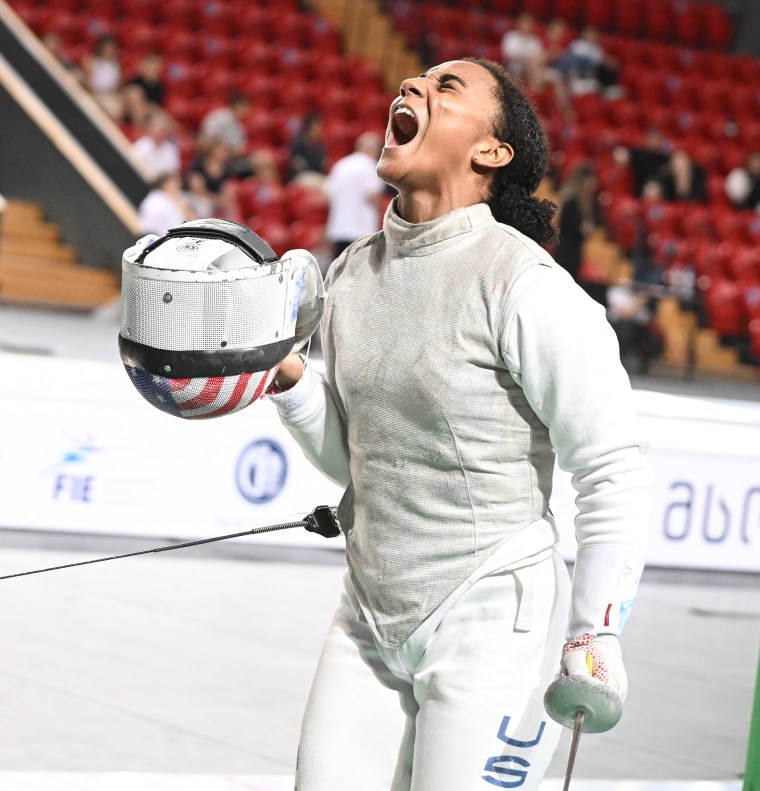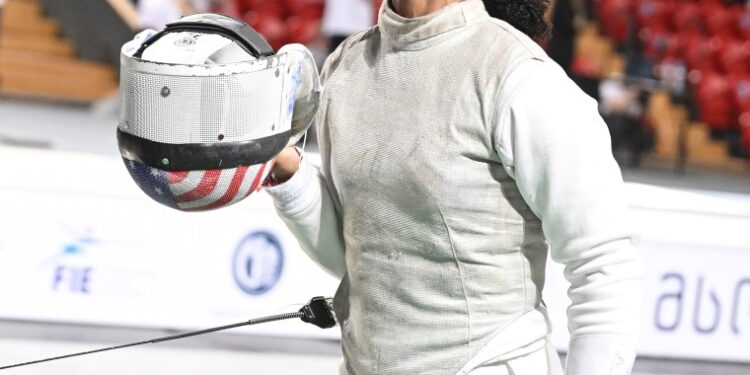Harvard University is known for a lot of things — but being an Olympic powerhouse hasn’t always made that list.
However, its fencing program has been dominating a niche in the sports world. Of the 20 fencers headed to the Olympics for the U.S., six are past, current or soon-to-be Harvard athletes. And two more Harvard fencers are set to compete in Paris as part of Canada’s national team.
Of the six Crimson athletes on the U.S. team, four are alumni — three of whom graduated only two months ago — one is a rising college senior and the other is a high schooler committed to the university.
While the Ivy League athletic conference has generally ruled the fencing world, Harvard was a relative underdog until recently. The eight Harvard fencers going to the Olympics this year outnumber the seven previously sent in the school’s entire history.
The six Harvard-affiliated athletes who will represent the U.S. are Lauren Scruggs, Eli Dershwitz, Filip Dolegiewicz, Colin Heathcock, Mitchell Saron and Elizabeth Tartakovsky.

At the center of the program’s newfound success is a former Ivy League fencer turned coach who has reconceptualized the program’s core approach to the sport.
Daria Schneider, an athlete representative for the U.S. Olympic and Paralympic Committee and Harvard’s new fencing head coach, said her philosophy to creating a good athlete is synonymous with forming a good person.
On building an athlete
Schneider, a five-time national team member and World Fencing Championships bronze medalist, fenced for Columbia University as a student. She became the first female coach of a men’s fencing team when she took the role at Cornell University in 2016.
In 2019, she took over the Harvard program. Shortly before that, the team had been under scrutiny as allegations that the former coach had accepted more than a million dollars in kickbacks in exchange for recruiting students to Harvard’s team.
(That coach, Peter Brand, was arrested and indicted on bribery charges in 2020 and acquitted two years later.)
In the four years since Schneider took over, the program won its second national title and has changed its approach to training, focusing more on working with athletes’ existing strengths, strict conditioning and mental health.
There isn’t a secret formula to the school’s success, Schneider said. A combination of little things add up to a different coaching panorama than the one Schneider knew as an athlete.
“I would say that it’s more creating an environment where there is opportunities for people to both figure out what they need to do to be training at the highest level they can,” Schneider said.
Fencing coaching at the collegiate level had previously focused on getting athletes to fit a specific mold. Schneider and her staff have rethought that.
“One of my main considerations as a head coach, and something I really asked my coaching staff to focus on, is what are ways we can help someone become a better version of themselves as a fencer without trying to remold them into some specific image of what we think makes the best fencer,” Schneider said. “We don’t break them down and remake them with the type of technique we think is best or the exact on guard position that we think is best.”
Still, Schneider says, her coaching is more strict than others on preventative physical therapy and mental toughness, which she describes as a way of preparing for a rainy day mentally.
“A lot of people who are starting to achieve mastery in something will seek out the ‘flow state,’” Schneider said. “And we do not seek out the flow state.”
“We prepare ourselves mostly for the days we will not enter a flow state,” she said.
About the athletes
Among the athletes expected to compete in Paris is Lauren Scruggs, a junior at Harvard.
Scruggs, who specializes in foil, is one of two Black U.S. fencers — male or female — to have won an individual world title.
A first-time Olympian, Scruggs has had a busy summer leading to Paris. Not only because of her preparation for the Games, but also because she is working as a full-time intern in wealth management.
Scruggs said having multiple things going on outside of the sport helps her keep focus.
“You get too messed up when you’re solely focused on something,” she said.
Scruggs maintains the same attitude as a college athlete, taking a full course load while balancing her fencing responsibilities. To her, like Schneider, it’s about balance and viewing students as a whole person rather than as an athlete first.
She met Schneider during her first Worlds competition, when Schneider was captain of the fencing team. They kept in touch, and when the time came to choose a college, Scruggs picked Harvard in large part because of Schneider’s recruiting efforts.
Still, it was a leap of faith. Harvard was not yet the fencing powerhouse it is in 2024.
One of the former assistant coaches at Harvard will also be repping Team USA in Paris. Dershwitz, a contender for medaling in men’s saber, coached Harvard athletes under Schneider.
Schneider praised Derwshitz as a leader.
“It is so rare in a sport like ours where it’s mostly individual that someone takes as much pride and and takes it as personally as he does, how the team does,” Schneider said. “Sometimes you might get someone who’s a very good team fencer, and maybe they perform really well on the team and they’re a great team leader, team captain, but they don’t quite have the individual results that they’re able to help the team achieve — and he does both.”
What to watch for in Paris
The job is not done yet for the U.S. fencers, though.
The U.S. has only won multiple fencing medals at six Olympic Games — including two at the pandemic-delayed Tokyo Olympics, six at the 2008 Beijing Olympics and its record of 10 at the 1904 St. Louis Games.
But in Paris, it has a chance to challenge and even surpass that Beijing total with medal contenders in the team events, as well as men’s individual foil, men’s individual saber, and women’s individual foil.
This year’s fencing team is the strongest American team in recent Olympic history.
Five of the six American disciplines (all but men’s epee) finished the 2022-2023 season ranked in the top five, according to the International Fencing Federation standings.
The men’s saber team of four is made up entirely of Harvard athletes, including Dershwitz.
He will see a tough battle against Hungary’s reigning Olympic saber champion, Aron Szilagyi, who could join Michael Phelps and only a few other Olympians who have won the same individual event four times.
Dershwitz defeated Szilagyi during the semifinals of the 2023 World Championships. If Dershwitz comes out victorious, he would be the first American to win gold for men’s saber in the history of the sport.







